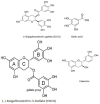Epigallocatechin-3-Gallate (EGCG): New Therapeutic Perspectives for Neuroprotection, Aging, and Neuroinflammation for the Modern Age
- PMID: 35327563
- PMCID: PMC8945730
- DOI: 10.3390/biom12030371
Epigallocatechin-3-Gallate (EGCG): New Therapeutic Perspectives for Neuroprotection, Aging, and Neuroinflammation for the Modern Age
Abstract
Alzheimer's and Parkinson's diseases are the two most common forms of neurodegenerative diseases. The exact etiology of these disorders is not well known; however, environmental, molecular, and genetic influences play a major role in the pathogenesis of these diseases. Using Alzheimer's disease (AD) as the archetype, the pathological findings include the aggregation of Amyloid Beta (Aβ) peptides, mitochondrial dysfunction, synaptic degradation caused by inflammation, elevated reactive oxygen species (ROS), and cerebrovascular dysregulation. This review highlights the neuroinflammatory and neuroprotective role of epigallocatechin-3-gallate (EGCG): the medicinal component of green tea, a known nutraceutical that has shown promise in modulating AD progression due to its antioxidant, anti-inflammatory, and anti-aging abilities. This report also re-examines the current literature and provides innovative approaches for EGCG to be used as a preventive measure to alleviate AD and other neurodegenerative disorders.
Keywords: Alzheimer’s disease (AD); aging and epigallocatechin-3-gallate (EGCG); inflammation; microglia; oxidative stress.
Conflict of interest statement
The authors declare no conflict of interest.
Figures






Similar articles
-
Epigallocatechin gallate attenuates amyloid β-induced inflammation and neurotoxicity in EOC 13.31 microglia.Eur J Pharmacol. 2016 Jan 5;770:16-24. doi: 10.1016/j.ejphar.2015.11.048. Epub 2015 Nov 28. Eur J Pharmacol. 2016. PMID: 26643169
-
Epigallocatechin-3-gallate Inhibits LPS/AβO-induced Neuroinflammation in BV2 Cells through Regulating the ROS/TXNIP/NLRP3 Pathway.J Neuroimmune Pharmacol. 2024 Jun 18;19(1):31. doi: 10.1007/s11481-024-10131-z. J Neuroimmune Pharmacol. 2024. PMID: 38886223
-
Beneficial Effects of Green Tea Catechins on Neurodegenerative Diseases.Molecules. 2018 May 29;23(6):1297. doi: 10.3390/molecules23061297. Molecules. 2018. PMID: 29843466 Free PMC article. Review.
-
Neuroprotective potential of epigallocatechin gallate in Neurodegenerative Diseases: Insights into molecular mechanisms and clinical Relevance.Brain Res. 2025 Aug 1;1860:149693. doi: 10.1016/j.brainres.2025.149693. Epub 2025 May 9. Brain Res. 2025. PMID: 40350140 Review.
-
Neuroprotective effect of epigallocatechin-3-gallate against beta-amyloid-induced oxidative and nitrosative cell death via augmentation of antioxidant defense capacity.Arch Pharm Res. 2009 Jun;32(6):869-81. doi: 10.1007/s12272-009-1609-z. Epub 2009 Jun 26. Arch Pharm Res. 2009. PMID: 19557365
Cited by
-
Phytochemicals Target Multiple Metabolic Pathways in Cancer.Antioxidants (Basel). 2023 Nov 17;12(11):2012. doi: 10.3390/antiox12112012. Antioxidants (Basel). 2023. PMID: 38001865 Free PMC article. Review.
-
Research Progress on Natural Plant Molecules in Regulating the Blood-Brain Barrier in Alzheimer's Disease.Molecules. 2023 Nov 16;28(22):7631. doi: 10.3390/molecules28227631. Molecules. 2023. PMID: 38005352 Free PMC article. Review.
-
Neurodegenerative diseases and catechins: (-)-epigallocatechin-3-gallate is a modulator of chronic neuroinflammation and oxidative stress.Front Nutr. 2024 Aug 1;11:1425839. doi: 10.3389/fnut.2024.1425839. eCollection 2024. Front Nutr. 2024. PMID: 39149548 Free PMC article. Review.
-
Polyphenols for the Treatment of Ischemic Stroke: New Applications and Insights.Molecules. 2022 Jun 29;27(13):4181. doi: 10.3390/molecules27134181. Molecules. 2022. PMID: 35807426 Free PMC article. Review.
-
Tea intake or consumption and the risk of dementia: a meta-analysis of prospective cohort studies.PeerJ. 2023 Jul 18;11:e15688. doi: 10.7717/peerj.15688. eCollection 2023. PeerJ. 2023. PMID: 37483967 Free PMC article.
References
-
- World Health Organization . Neurological Disorders: Public Health Challenges. World Health Organization; Geneva, Switzerland: 2006.
Publication types
MeSH terms
Substances
Grants and funding
LinkOut - more resources
Full Text Sources
Medical

